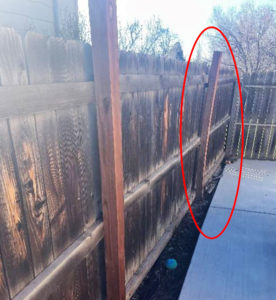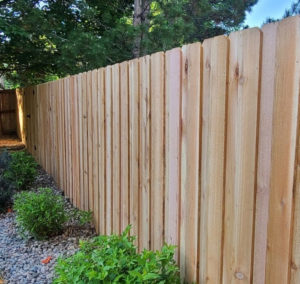Here’s a scenario that happens quite often: a fence is damaged or completely blows over in high winds (especially here in Colorado). The homeowner may have animals or children in their household and yard and need to have that fence repaired as quickly as possible. They see advertisements for fast fence repair that always seem to pop up after a big storm. Their fence is repaired quickly, and they think all is well.
Enter stage left: The Wrong Type of Wood for a Fence Post. Chances are, if it feels like the price for fence repair was too good to be true, it probably was. That’s because many fencing contractors skimp on material and use cheaper wood for fence posts and it ends up doing more damage to the fence, or ruining it entirely. Since many fence repairs only include replacing the posts of the fence, the structure upon which it’s built, it’s imperative that the posts are durable and long-lasting.
In this post we explain why redwood and pressure-treated wood such as pine, when used for fence posts, will cause big problems later. The best choice is cedar fence posts, for a very interesting reason.
Related post: Why You Want Your Fencing Contractor to Use Quality Lumber
Redwood = No Good (for Fence Posts)

Often, redwood is chosen by fence contractors because it’s more readily available and less expensive than cedar. Also, redwood can mimic cedar in looks, people often mistake it for cedar, so ensure you know what you are getting from your contractor.
Redwood can be used on something like a deck because it’s fastened securely, but it should not be used for fence posts due to its propensity to bow every which way. The level of bowing is quite dramatic: redwood can bow up to a foot out of place and completely ruin a fence, requiring replacement of the posts.
Pine is Not Fine for Outside
Pine wood is great for indoor paneling, railings, and other in-home features. But it’s just not right for outdoor applications like decking or fences. This is because pine is pressure-treated, a process in which a preservative is injected into the wood to make it last longer. Most pressure treated wood out there is pine. Pressure treated wood can be identified by lines in the wood where they apply pressure and inject the preservative.
Even though the pine is treated to last longer, this doesn’t apply when it gets repeatedly wet, as it will while outdoors. Compounding the issue is that usually when the pine is purchased it is still very wet. Once the wet, treated wood is placed in the ground as a fence post, it will begin to twist and bow. And over time, as it’s exposed to weather, the wood absorbs more moisture and begins to twist and bow even further. Even kiln-dried wood will bow when it gets wet out in the elements.
Depending on the weather where the fence is, the pine can start to move out of shape soon after placement, or up to a year later. Either way, the fence structure is now ruined and must be redone.
A homeowner will first see cracks in the wood developing due to the twisting that’s occurring. The wood can warp so dramatically that the nails can be twisted right out of it.
Note that Douglas fir is a pine species and also should not be used for fence posts. The bottom line is that any type of treated wood should not be used on a fence.
Cedar Fence Posts: What’s the Secret?

Cedar wood is different. It is porous and allows water to come in and out of the wood. It expands or contracts depending on the water content. Cedar is the only wood that can do that and not bow, making it the best choice for fence posts, and fence planks as well. Cedar is a powerhouse wood that will not twist, bow, or cup. As an added bonus, cedar contains an oil that naturally repels insects such as termites and ants.
Western Red Cedar is a good choice for the Colorado climate as it comes from Canada, a similar dry climate. This cedar stands the test of time and can last up to 40 years. We use Western Red Cedar fence posts and planks and are proud of the quality we provide to our customers.
Before having your fence repaired or replaced, ensure that cedar posts are being used and your fence will have a very long life.
Learn more about our cedar fences and receive a free estimate
